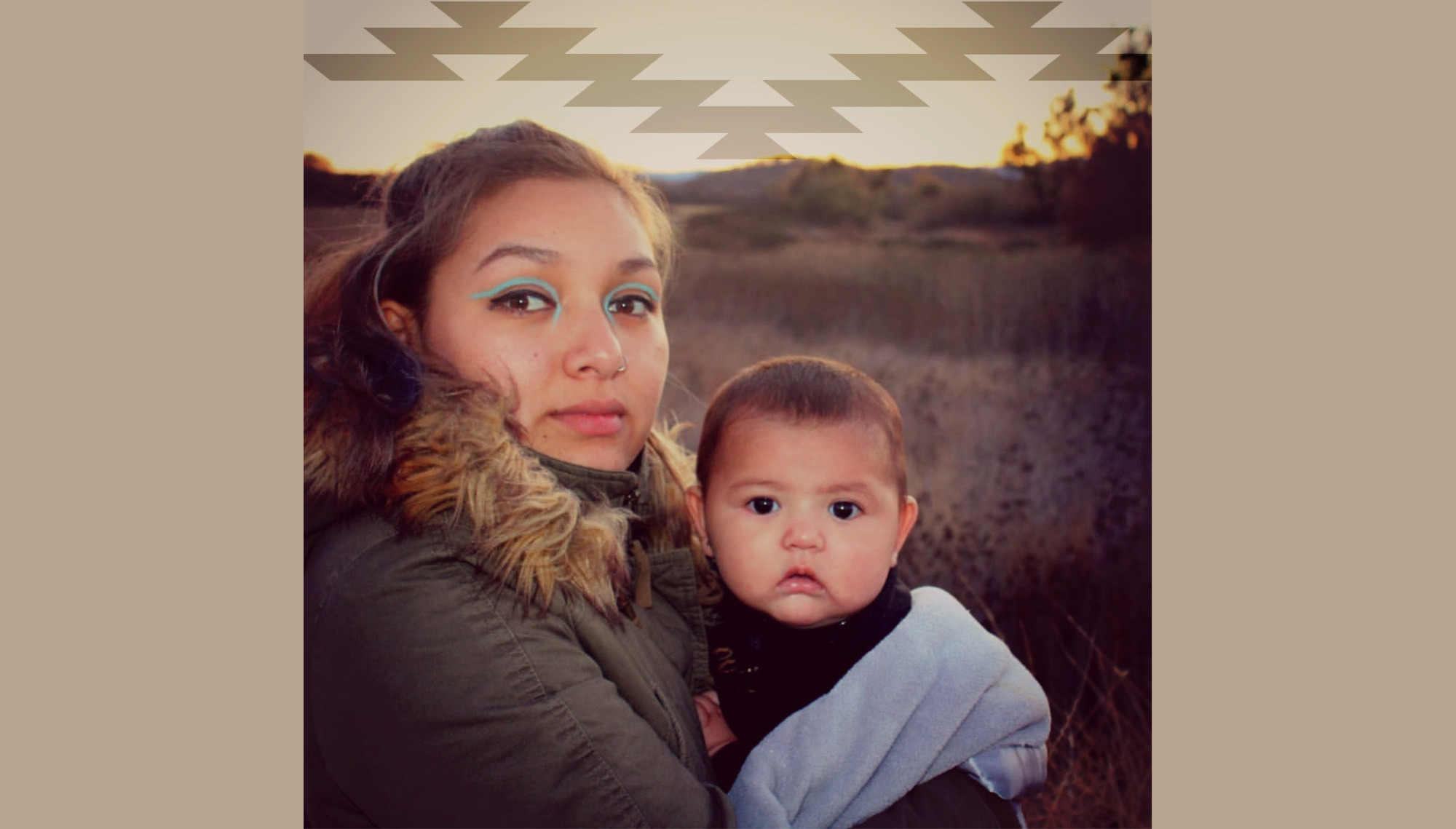Elaina Albers, a 24-year-old descendant of the Yurok, Wiyot, Karuk, Hoopa and Bear River tribes, has been looking for stable housing in Northern California since she was 19. After cycling through stays with family members and living with her 3-year-old daughter in an apartment in a “sketchy” part of town, she said she was finally able to find an affordable cottage near Eureka in August.
“Being able to have a place to call home, that is something a lot of people don’t get to have growing up.”
California’s foster youth are eligible for extended benefits like housing subsidies, cash assistance, and caseworker help as they age out of the system between ages 18 and 21. But rental prices are so high in Humboldt County that some youth can barely afford apartments on their benefits. Paying the bills becomes even more challenging when they “age out” of benefits.
“Being Native, we’re already so displaced in a world where we don’t know where we come from and we don’t know our history as well as you would like to,” Albers said. “Being able to have a place to call home, that is something a lot of people don’t get to have growing up.”
Tribes like the Yurok and the neighboring Wiyot, Hoopa, Karuk and Bear River Band were violently displaced by American colonists in the 19th century. The ripple effects of that removal are still being felt today, with a disproportionate number of Native Americans in this region living without a home, below the poverty line and in the foster care system.
In 2019, the city of Eureka formally returned the Wiyot Tribe’s native Tuluwat Island in a historic “Land Back” victory, part of a national movement to restore Indigenous sovereignty by returning ancestral lands to Natives. In 2022, the federal government also agreed to remove four dams that blocked the Klamath River, opening up hundreds of miles of salmon habitat that is not just important as a source of food for regional tribes but also a major aspect of their culture and way of life.
Reclaimed Wiyot Tribe land to become youth housing
The Wiyot are now creating housing on their ancestral lands in the city of Eureka for some of their most vulnerable members: young people aging out of the foster care system. They’re doing it with the first-ever tribally-owned community land trust, named Dishgamu, which means “love.”
“My dream for this housing for youth is really that we provide a place for people to go that either prevents them from being houseless or prevents them from having to leave the area,” said Wiyot Tribal Administrator Michelle Vassel, who is leading the housing development.
The Wiyot’s displacement from Tuluwat Island, on California’s northern coast beside the city of Eureka, dates to 1860, when a group of missionaries raided the island during the Wiyot’s annual World Renewal Ceremony and massacred between 80 and 250 people in their sleep. After county officials marched the remaining 450 tribal members to the Klamath Reservation, the Wiyot spent more than a century working to get their land back — first reclaiming 20 acres in what is known as the Old Reservation in 1908, and then another 88 acres on the Table Bluff Reservation in the 1990s. Efforts culminated in 2019 with the city of Eureka formally returning Tuluwat Island to the tribe.

Conor P. Fitzgerald/Shutterstock
An old shack next to one of the few private houses on Tuluwat Island in Eureka, California on June 4, 2023.
“No municipal government had ever given back land to a tribe without being forced by some kind of legal action to do so, so that was a big jump for them,” Vassel said. “It took a lot of work in the community to get to that spot.”
Skyrocketing rent
Amidst inflation and limited development, affordable housing is increasingly inaccessible across the Golden State. Native Americans in California represent just 2% of the state’s population, but represent 12% of those experiencing homelessness, according to a recent University of California San Francisco report. According to the National Alliance to End Homelessness, Humboldt County has the highest rate of homelessness per capita in the country.
“[Land] was illegally taken from Wiyot people,” Vassel said. “The people that are benefiting from that today, that have intergenerational wealth within their families, are people that basically got free land in 1860, and then their children didn’t have to worry about that and could continue to grow and prosper.”
One-third of people who live on federally designated tribal lands in California live below the poverty level, which is double the rate of the state generally. Altogether more than 60% of the Wiyot Tribe has had to leave the region, Vassel said.
“Dishgamu Humboldt seeks to establish radically alternative forms of housing development that remove the profit-motive and empower communities,” the land trust’s website states.
Vassel said Natives are used to a “pendulum swing” of popular support: “This week, this is popular, but tomorrow, it’s not anymore.”
“When you aren’t in control of your own systems, you become subject to that pendulum swing,” she said. “That’s what sovereignty is about, and that’s why we wanted to create our own land trust.”
Wraparound transition services
The new housing developed by the tribe’s community land trust is named Jaroujiji, which means “a place to stop and rest.” Two old Victorian structures and another unused commercial building in downtown Eureka will be repurposed to provide in-house mental health and social services for youth in the community between ages 15 and 22. Although it’s open to everyone, foster youth will be prioritized.
Being in the foster care system can be a traumatic experience in itself, and foster youth are at an increased risk of mental health problems and incarceration. This age group is particularly vulnerable as they age out of the foster care system: Data show up to 36% of foster youth experience homelessness during their transition out of care.
“There are kids in our community that have no place to go that are teenagers,” Vassel said. “We wanted to have a place where we can support them.”
Native children are overrepresented in the foster care system nationwide and in Humboldt County, where they comprise between 6% and 12% of the population but at least 30% of youth in the system.
Humboldt County’s foster services face a growing list of complaints. In March, the Bear River Band of Rohnerville Rancheria filed suit in California Superior Court alleging that Humboldt County and the state’s Department of Health and Human Services violated the rights of Madison Fischer, one of their tribe’s members, when they terminated her state foster care benefits after she began to receive tribal benefits.
The suit alleges Fisher was given a week’s notice to vacate the housing that was originally arranged for her by the county
“Traditionally, there was no houselessness. We took care of each other.”
In 2015, a grand jury investigated alleged “dysfunctional work guidelines, distrustful working relationships, unresponsive upper management, mass resignations, and an unsupportive work environment,” within the Humboldt County Department of Health and Human Services, leading to a settlement in 2018 with the California Bureau of Children’s Justice. A May 2023 report from the Humboldt County Civil Grand Jury found many of the issues identified in the first investigation persisted. The report found a far larger percentage of Native children in the foster care system, in particular, experienced court cases with late filings compared to white children.
“The state of child welfare in Humboldt County is a disaster,” said Kimberly Cluff, the legal director of the California Tribal Families Coalition, who is representing Fisher in the case. “We have lots of Native youth who are in need of stable housing, especially as they’re aging out of the foster care system.”
In an email, deputy branch director for the Humboldt County Department of Health & Human Services Child Welfare Services Division Ivy Breen said the agency is using a “Continuous Quality Improvement approach to improve service delivery and compliance in several critical areas, including timely court reports and timely investigation closure.”
Breen described recruitment for child welfare workers as “an ongoing challenge” and said the department is trying to staff up and retain workers. “Retention and morale are also challenging, as well as gaps between community expectations of CWS and our mandates,” she wrote.
Vassel, the Wiyot tribal administrator leading the housing initiative, said children in the Humboldt County foster care system are often transported hundreds of miles away to Bakersville or Sacramento for services. Young people work two or three minimum-wage jobs to be able to pay rent. Some spend months waiting for assistive housing and need somewhere to stay in the meantime. Tribes sometimes offer housing to members, but there is a lot of need and many who apply are waitlisted.
Constantly moving around is something familiar to many youth who spend time in the foster care system. Albers, who lived in eight different homes throughout 13 years in the system, spent a decade on the Hoopa reservation but also had placements in Sacramento and as far north as Portland, Oregon.
She hopes to become a counselor or therapist and is working to complete a degree in psychology and early education for child development at the College of the Redwoods. She said she wishes the state provided housing for former foster youth until age 26, rather than 21.
“Housing helps not just giving you a place, but housing can also help you feel a sense of home in yourself,” Albers said.
The Wiyot’s new housing development, Jaroujiji, was the name of one of many Wiyot villages around what is now Eureka. In order not to put too much strain on the natural resources, the Wiyot dispersed themselves across the land in small groups, coming together to build a community that lived in harmony with the environment around them.
“No matter how many times [the Wiyot] were relocated … they continued to return home,” Vassel said.
Jaroujiji, under its tribal land trust, is designed to ensure that tradition stays alive.
“Traditionally, there was no houselessness,” she said. “We took care of each other.”
***
Elizabeth Hlavinka is a Costa Rica-based journalist who covers health and the environment.
































